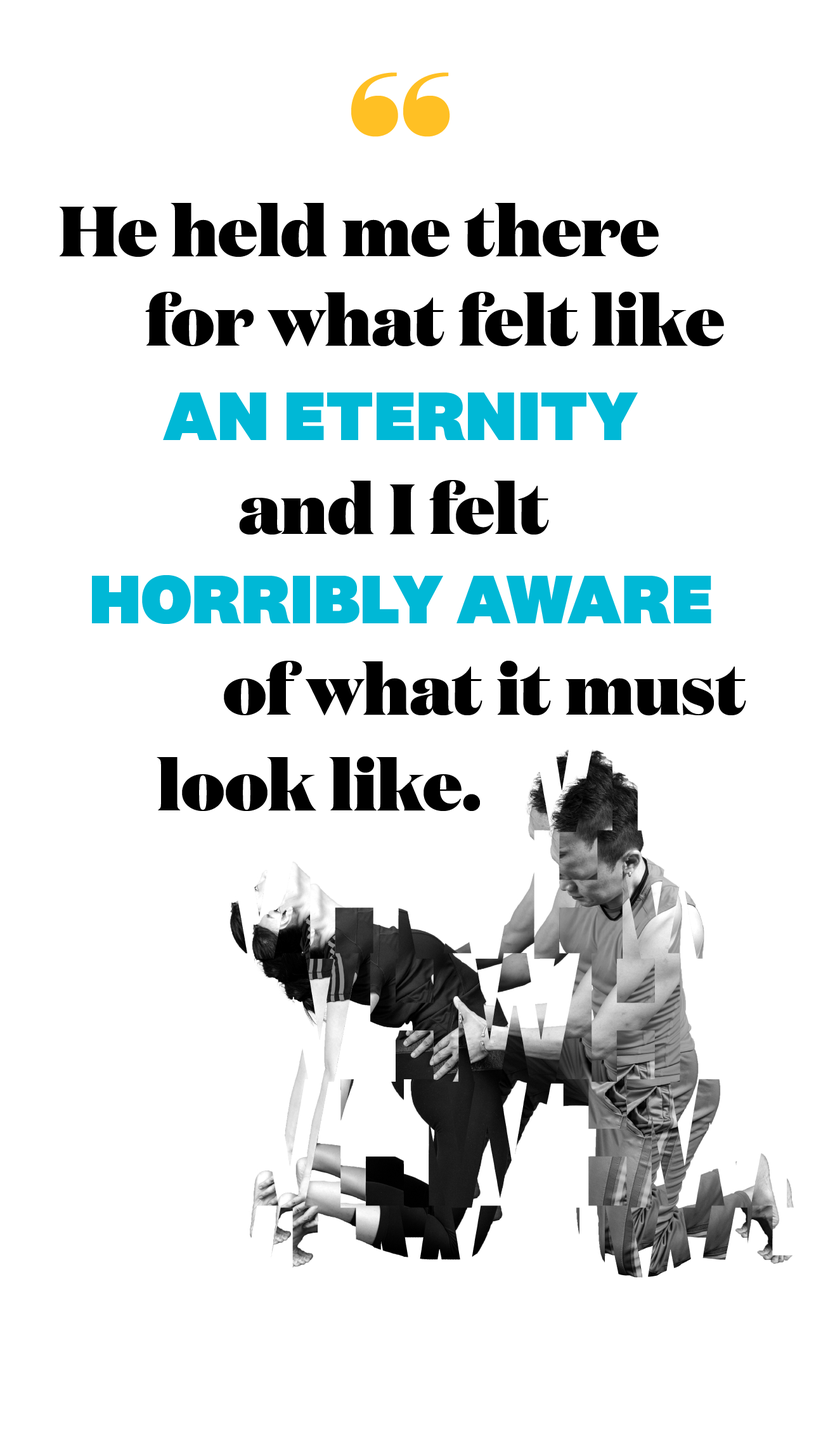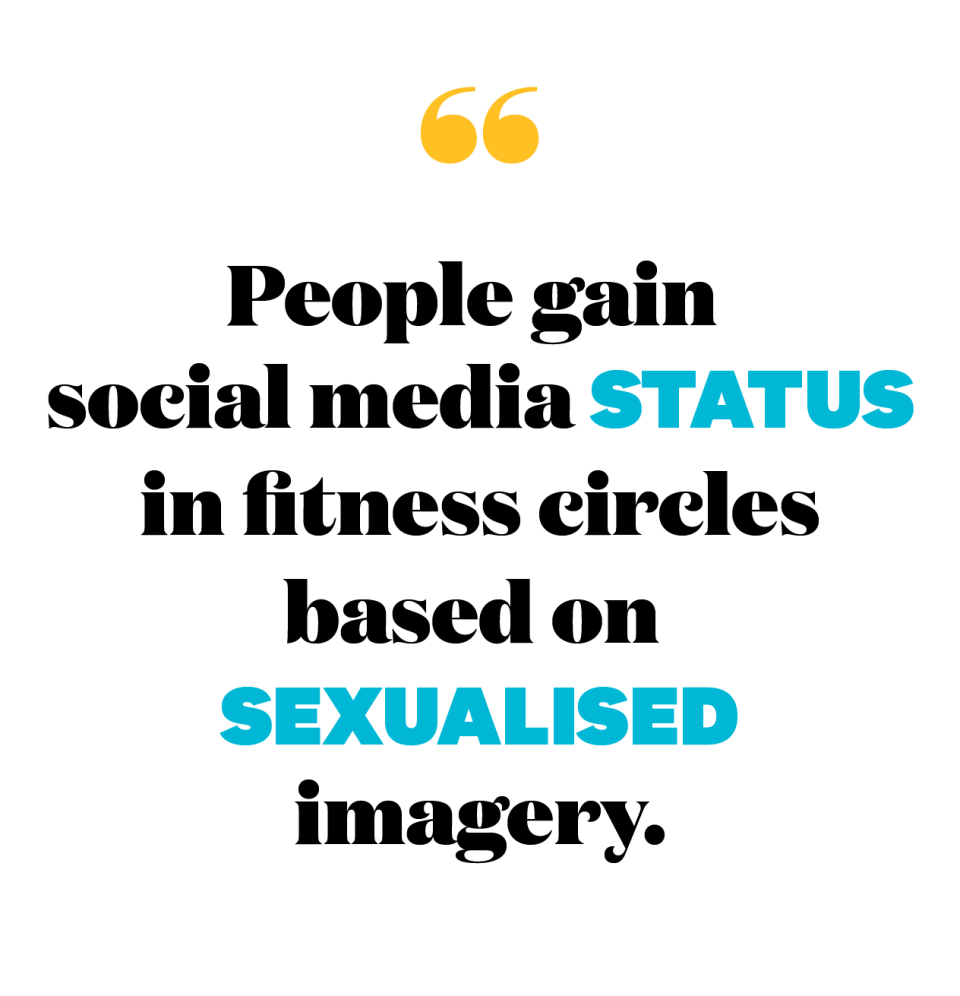These Women Have All Experienced Sexual Harassment in Gyms - Is Fitness Due Its #metoo?


It’s not the place of Women’s Health to wade into a social media storm, blindly accepting who a storyteller has cast as their villains, damsels and saviour. So, we’re not going to report the back-and-forth of an Instagram post that sent ripples through the London fitness scene earlier this month.
What we will say, however, is that the conservation that’s snowballed from one PT calling out another trainer from a separate studio for allegedly slapping a woman’s bum and calling her ‘a good girl’ in a group class, has clearly tapped into something. And it's something we’re determined to understand a little better.
The talk about sexual harassment within fitness and wellness spaces has been bubbling for a while. In June 2019, survey data from reviews site FitRated found that 71% of women are harassed at the gym on a daily basis. And in data released earlier this month from sportswear sales company GolfSupport, 78% of women were found to fear harassment in the gym.
This isn’t a story playing out exclusively in high-octane, testosterone-fuelled workouts, either. Accusations of sexual harassment at the hands of yoga teacher trainers have been murmured in the global yoga community for years; accusations that were given a global platform last November when Bikram: Yogi, Guru, Predator dropped on Netflix. The documentary lays out - in excruciating detail - the sexual harassment and assault that multiple former students of Bikram Choudhury, the Indian-American yoga teacher and founder of his eponymous hot yoga method, claim to have been subjected to while in his tutelage.
The topic has sparked much debate in the Women’s Health offices over how big a problem sexual harassment is in the fitness and wellness world. So, we set out to find out what it is, what’s being done to combat it and, crucially, what women like you can do if it happens to you.
We asked you. The positive news is that, on the whole, the answer is no - according to the vast majority of the 5,000+ people who responded to a poll we posted on our Instagram Stories, enquiring about your experiences of gym harassment. 95% of respondents reported that they hadn’t been touched inappropriately in a workout class; 94% reported never experiencing a yoga teacher come too close for comfort when adjusting their form; 89% have not been made to feel uncomfortable in a PT session.
And yet…that leaves over 1,200 incidents where a fitness professional did cross a line. To be clear, we’re not talking about sexual assault or violence, but smaller acts and words – microaggressions – that, according to your stories, take place in poorly-staffed leisure centres, budget gyms and elite £20-a-class studios alike. While these incidents may seem comparatively minor, they have consequences – psychological and financial – and they deserve to be heard.
Until 2017, Charlotte Foster was a regular at the north London branch of a studio that offers high-intensity interval workouts. ‘But then I noticed that one of the trainers would sexualise the movements that he was asking us to do and provide corrections in a similar manner,’ the 33-year-old business consultant tells WH. ‘He’d correct deadlifts with directions to “bend over like you were taking it from behind”.’
Project manager Kristine Weeks, 30, had a similar experience a few years ago at the London branch of a buzzy, relatively high-end, medium-size gym chain. ‘A trainer who’d started off being friendly began making faces at me in the mirror when I was on the treadmill, running his tongue all round his lips,’ she recalls. The final straw was when he made a gesture on the machine next to me about my bum while I was squatting; I was completely mortified.’

For Nadja Cook*, a 30-year-old student communications officer, the harassment she experienced in 2015, at the start of her fitness journey, crossed such a line that it left her fearful for her safety. ‘I’d asked to book in a session after a trainer approached me in the gym of my local leisure centre to correct my squat form,’ she explains. ‘We were communicating via text and, after we couldn’t find a good time, he began sending me messages asking how I was, then he started drunk texting me – even trying to come over to my house.’
In spring 2019 Sharon McAvoy, 36, was sprinting on a treadmill in the Canary Wharf branch of a well-known budget gym chain – headphones on – when a young, male PT approached her and stood next to the machine. He asked the mum-of-two if she wanted to date him and, when she politely declined, told her he was only joking and that she looked ‘manly’ anyway. ‘I was completely taken aback, embarrassed, and was instantly questioning myself and my looks. I’m a PT myself, and I’d never want to leave a woman I train feeling like that.’
Several women reported having the calming sensation of their yoga sessions punctuated by (in the cases reported to us, all male) yoga teachers. The teacher in tiny shorts who leaned his groin forward onto Claire O’Keefe* from Glasgow, while her bum was in the air in downward dog pose. ‘He held me there for what felt like an eternity and I felt horribly aware of what it must look like. I spent the whole class distracted, trying to ensure my form was perfect so he wouldn’t do it again. But he did, multiple times. I was 24, had only been practising yoga for a year, and didn’t feel like I could say anything.’

Then there was the instructor who taught Lainey Lacey, a 29-year-old retail strategist at a premium gym club near to London’s financial district. ‘I got up to leave the class early because he said he would be coming round with massage oils at the end and I didn’t want to be touched like that,' she recalls. ‘He drew attention to me when I left, and made me feel really awkward, as though I’d done something wrong.’
Opinions differ. Francine Davis, Strategic Director of Pure Gym told the BBC that gyms mirror the world outside – that ‘harassment can happen in any area of life’, inferring that this is a societal issue. But others believe that elements of this story are industry-specific.

For Nike trainer Luke Worthington, who works at London’s Third Space, the foundations of potential problems are laid when would-be PT’s are in training. ‘The fitness business is booming and a consequence of this is that the barrier to entry as a professional – which has always been too low – is almost non-existent,’ he explains. ‘Qualifications are being offered on way too little contact time, meaning people are getting jobs in positions of responsibility with little to no training.’
And with a lack of training, he believes, comes a truncated ability for trainers to be flexible and respond to their clients as individuals, and that imposing blanket standards on clients is not only insensitive, it’s completely unnecessary. ‘There is no exercise that absolutely requires physical contact to coach,’ adds Worthington. ‘Everything can be taught, and taught well, through demonstration and explanation.’
This explosion in the popularity of fitness has, according to Cathy Brown - former professional boxer and founder of Boxology, a mind/body confidence programme combining elements of boxing and CBT - created a perfect storm.
In her opinion, harassment by trainers in gyms seems to have become a bigger problem in recent years. ‘I get people coming up to me saying, “What shall I do? I’m working out in the gym alone and a personal trainer keeps interrupting me by coming on strong - asking for a date or trying to push for me to sign up with them to do personal training”,’ she tells WH.
‘Gyms put these trainers – often young men – under this pressure because they’ve got to hit their numbers and recruit clients, but they need to be told how to do this with a bit of etiquette and awareness.’
Through his research on contemporary fitness culture, University of Winchester sociologist Dr Luke Turnock found that many women - and men - believe the gym has become a significantly more sexualised space in recent years.
‘Several study participants highlighted the issues caused by Instagram, where people gain social media status in fitness circles based on sexualised imagery,’ he explains. As for how this translates from your feed to the free weights area? ‘People reported that this led to the gym environment itself being sexualised for women who do not wish it to be and who are only there to train.’

What’s more, he argues that the set-up of most gym chains only intensifies this feeling that working out is a performance. ‘The advertising, the mirrors, lighting, even the way the machinery is positioned often gives the feeling of being “on stage”, which can contribute to a feeling that the gym is all about looks,’ he explains.
‘Some men may take this as a signal that certain behaviours are acceptable in this social context, where they wouldn’t be in others. For example: “she must want to be looked at because she is on show, therefore it is acceptable for us to be commenting on her looks and making sexual comments”.’
And, while Dr Turnock has not specifically researched sexual harassment at the hands – and mouths - of fitness professionals, he believes that, ‘with personal trainers subscribing to these cultures, I can easily see where there would be those sorts of effects.’
For Nadja, returning to the gym and risking running into the man who had been harassing her over text was out of the question. ‘I just quit,’ she says. ‘I emailed the leisure centre to report the incident, but they never got back to me.’
As for the instructor who made the sleazy comments to Charlotte in class? ‘I spoke to him multiple times, but he would always laugh it off and only correct the behaviour for a short time before reverting back to type. Eventually it got so bad that I just stopped going to that studio, forfeiting a number of sessions I’d already paid for.’
When women did take their concerns to managers, the response was mixed. ‘I went to the woman behind the desk who I assumed was the manager to report how I’d just been spoken to and she just shrugged it off, suggesting it was just “gym floor banter”,’ Sharon recalls - something that suggests this culture problem isn’t neatly split down gender lines.

Thankfully, the man behind the desk at Kristine’s former gym was a little more receptive. ‘I asked him to cancel my membership and got embarrassed when he asked why, but once I’d blurted it out, he looked horrified, asked me to point him out, and gave me a full refund immediately,’ she recalls. On leaving the gym, Kristine’s emotions were mixed. ‘I really didn’t want to make a big deal of it, but I couldn’t leave without saying anything.’
By calling out their trainers, Charlotte, Sharon and Kristine are in the minority, both among the stories submitted to us – and the data from the aforementioned FitRated survey, which found 50% of respondents chose to leave the scene after they were harassed, and that only 8% of women felt confident enough to confront their harassers.
For many women who reached out to us, it was the fear of making a fuss – that Kristine referred to – or not having the adequate framework to report issues anonymously that left many to call time on their sessions.
Others, like Claire, didn’t feel able to say anything because she assumed the instructor – the expert – must be right. ‘I told myself I was being a prude and that he was just doing a yoga teacher’s job,’ she recalls. ‘I’d never have dreamed of saying anything to him or the studio.
Women’s Health reached out to eight of the UK’s biggest gym chains, asking for them to share their harassment policy. The picture wasn’t exactly encouraging. From three, we heard nothing back. Two - including a chain whose trainers were implicated in a number of harassment stories we received - were reticent to provide a written statement and, by the time of writing, never did. Representatives for another said they’d provide one but, haven't followed up.
Virgin Active’s senior communications officer told us the following: ‘All complaints we receive are dealt with quickly and firmly with our dedicated safeguarding team at the forefront of any investigation. Where appropriate, we will also work alongside the police and support any members or staff through the reporting process if they wish us to.’
While the CEO of EasyGym offered the following: ‘If we are made aware of an issue, through a direct report to our manager or online through customer services or social media we will always investigate the matter. If we are able to obtain proof of harassment or behaviour deemed inappropriate...we will never hesitate to immediately remove the offending party, whether it is an employee, self-employed trainer or indeed a fellow member.'
It suggests the industry has a way to go when it comes to taking this issue seriously - let alone adequately tackling it. What Brown - herself a domestic violence survivor, who has also taught boxing to some of the world’s most traumatised women in Iraqi refugee camps – believes that what fitness spaces really need is a better understanding of boundaries.
Need a definition refresher?
‘Boundaries aren’t rigid walls, they’re just guidelines, rules or limits you create in order to show how you want people to behave around - and communicate with - you,’ explains psychotherapist Jenni Miller, who has literally written the book on the subject, Boundaries: How to draw the line with work, in love and at home. ‘They’re not about restricting your life, though, you create boundaries to help you make sure you let the right people and experiences into your world.’
There are few places where boundaries are more important than within the context of fitness. Workouts are ‘you’ time: sections of the day in which you unapologetically prioritise your mental and physical health. These are positive moments and you owe it to yourself to do your best to keep them that way.
In an ideal world, Brown believes gym employees should be well versed in asking clients what they’re comfortable with – and what they’re not. But, as things stand right now, she believes the onus is on gym-goers to lay down their terms.

‘There’s an element of personal responsibility here,’ she adds. ‘Yes, you are paying them to lead the session, but you’ve still got to say, “This is me; these are my boundaries; this is what I feel comfortable and uncomfortable with.’
Will Wheeler, who teaches yoga at Level Six Studio in Peckham, is similarly adamant that people who work with clients’ bodies shouldn’t be expected to read their minds. ‘If you’re going into an environment where you may be touched to help you achieve good form and technique, you need to take ownership of your own body,’ he offers. ‘Say to the instructor: ‘’Just to let you know I don’t feel comfortable with being assisted in this position, so speak it to me, please, don’t touch me’’.’
Not confident with that? To navigate the tricky realm of physical touch in class you can purchase yoga consent cards.

Kristine believes that now, faced with a gym employee making overtly sexual faces at her, mid-workout, she wouldn’t wait to report them - and wouldn’t beat herself up over making a fuss.
‘I don’t know whether it’s the awareness the media has brought about harassment, or whether growing older has made me more confident in knowing when something has gone too far...maybe it’s a mix of both,’ she muses. ‘But if you’re not sure, my guess is that 99% of the time you’re having this feeling for a reason - and what’s going on isn’t right.’
Quite. ‘I think sometimes people are unsure what the “rules” are, and when it’s okay to complain,’ says Worthington. ‘But the rules are your own. If someone’s behaviour is making you feel uncomfortable, you don’t have to tolerate that under any circumstances or in any setting.’
Received and understood? Good – now pass it on.
You Might Also Like

 Yahoo News
Yahoo News 
